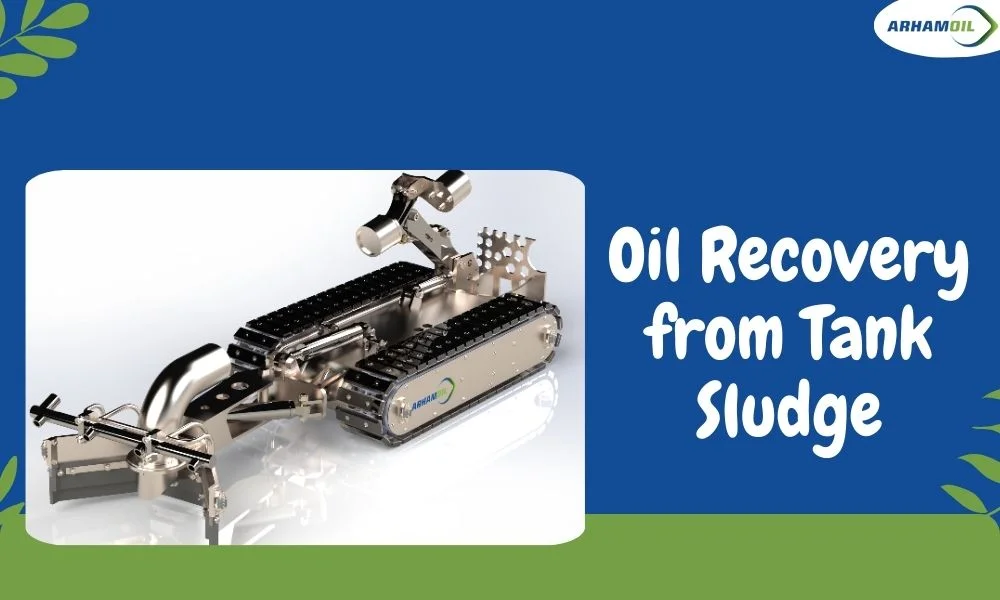Biological Treatment of Oil Sludge: Eco-Friendly Solutions for the Oil Industry
January 22, 2025Magnetic Robotic Crawler for Tank Cleaning
January 28, 2025The oil and gas industry faces a persistent challenge: the accumulation of tank sludge. Over time, storage tanks used for crude oil and petroleum products collect a dense, sticky residue at the bottom. This sludge, composed of hydrocarbons, water, sediments, and other impurities, reduces storage capacity and can pose operational and environmental risks. However, rather than discarding this sludge as waste, modern techniques enable the recovery of valuable hydrocarbons, offering both environmental and economic benefits.
In this blog, we’ll explore the innovative methods used for oil recovery from tank sludge and discuss the financial advantages they bring to industries.
Understanding Tank Sludge and Its Composition
Tank sludge is formed due to the settling of heavier hydrocarbons, sediments, and impurities over time. It contains a mixture of:
- Recoverable hydrocarbons: Crude oil or petroleum products trapped within the sludge.
- Water and sediments: Non-hydrocarbon components that accumulate at the tank’s base.
- Contaminants: Heavy metals, sulfur, and other impurities that complicate disposal.
While this sludge was historically considered a waste product, advancements in technology have turned it into a valuable resource.
Techniques for Oil Recovery from Tank Sludge
The recovery of hydrocarbons from tank sludge involves specialized processes designed to separate oil from water, sediments, and contaminants. Let’s delve into the most effective techniques:
1. Mechanical Separation
Mechanical separation uses equipment like centrifuges, decanters, and separators to extract oil from sludge. These machines operate based on differences in density, efficiently separating oil, water, and solid particles.
- Advantages: High recovery rates and minimal environmental impact.
- Applications: Ideal for large-scale operations in refineries and storage facilities.
2. Thermal Desorption
Thermal desorption involves heating the sludge to high temperatures to vaporize hydrocarbons. The vapor is then condensed back into liquid oil, leaving behind solid residues.
- Advantages: Effective for removing heavy hydrocarbons and contaminants.
- Limitations: Energy-intensive and requires proper handling of emissions.
3. Chemical Treatment
Chemical treatment uses solvents or surfactants to break down the sludge and release trapped hydrocarbons. This method enhances the separation of oil and water while reducing the viscosity of the sludge.
- Advantages: Suitable for stubborn sludge with high viscosity.
- Applications: Often combined with mechanical or thermal methods for better results.
4. Bioremediation
Bioremediation employs microorganisms to degrade hydrocarbons in the sludge, converting them into harmless byproducts like water and carbon dioxide. While primarily used for environmental cleanup, this method can also aid in recovering lighter hydrocarbons.
- Advantages: Eco-friendly and sustainable.
- Limitations: Slower process compared to mechanical or thermal methods.
5. Robotic Sludge Removal Systems
Robotic tank cleaning systems have revolutionized sludge management by enabling no-man-entry cleaning and recovery. Equipped with advanced sensors and pumps, these robots can operate within confined spaces, ensuring efficient recovery of hydrocarbons while minimizing human risk.
- Advantages: Safe, precise, and capable of operating in hazardous environments.
- Applications: Ideal for industries prioritizing worker safety and operational efficiency.
Economic Benefits of Oil Recovery from Tank Sludge
Recovering oil from tank sludge is not just an environmental imperative—it’s a sound financial strategy. Here’s how industries benefit economically:
1. Revenue Generation
Recovered hydrocarbons can be reprocessed and reused, providing a new revenue stream for industries. Instead of treating sludge as waste, companies can convert it into valuable products.
2. Reduced Disposal Costs
Disposing of untreated sludge involves significant costs due to strict environmental regulations. By recovering oil, industries can minimize the volume of waste requiring disposal, cutting down on expenses.
3. Increased Storage Capacity
Sludge buildup reduces the effective storage capacity of tanks. Regular recovery and cleaning restore this capacity, enabling more efficient operations and higher throughput.
4. Compliance with Environmental Regulations
Proper sludge management ensures compliance with environmental standards, avoiding hefty fines and penalties. It also enhances the company’s reputation as a responsible industry player.
5. Operational Efficiency
Clean tanks improve the efficiency of storage and transportation systems, reducing maintenance costs and preventing equipment damage caused by sludge-related blockages.
Environmental Benefits of Oil Recovery
The environmental advantages of oil recovery from tank sludge cannot be overlooked. By reducing waste and reusing valuable resources, industries contribute to sustainable practices. Key benefits include:
- Minimized pollution: Prevents the release of harmful contaminants into soil and water.
- Resource conservation: Reduces the need for extracting new oil by utilizing recovered hydrocarbons.
- Lower carbon footprint: Eco-friendly recovery techniques reduce greenhouse gas emissions.
Why Choose Arham Oil for Oil Recovery Services?
At Arham Oil, we specialize in innovative, eco-friendly solutions for oil recovery from tank sludge. With years of expertise in sludge management, we provide customized services tailored to the unique needs of each client. Here’s why industries trust us:
- Advanced Technology: Our state-of-the-art equipment ensures maximum recovery efficiency and minimal environmental impact.
- Safety First: We prioritize worker safety with robotic systems and no-man-entry techniques.
- Cost-Effective Solutions: Our services are designed to deliver long-term value, optimizing both operational efficiency and financial returns.
- Environmental Commitment: We adhere to strict environmental standards, promoting sustainable practices in every project.
Whether you want to recover valuable hydrocarbons or ensure compliance with regulations, Arham Oil is your trusted partner for oil recovery from tank sludge.
To summarize, Oil recovery from tank sludge is a game-changer for industries looking to enhance efficiency, reduce costs, and adopt sustainable practices. Companies can transform waste into a valuable resource by leveraging advanced techniques like mechanical separation, thermal desorption, and robotic systems.
At Arham Oil, we’re proud to lead the way in providing innovative sludge management solutions. With a commitment to safety, sustainability, and excellence, we help industries unlock the full potential of oil recovery while safeguarding the environment.
Ready to revolutionize your sludge management process? Contact Arham Oil today to learn more about our services.


